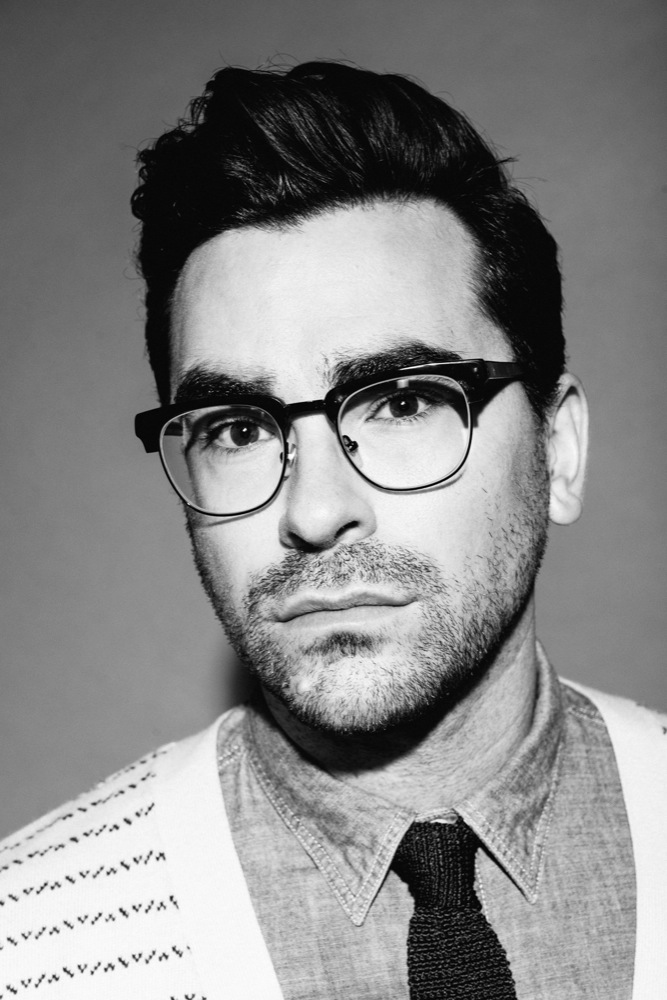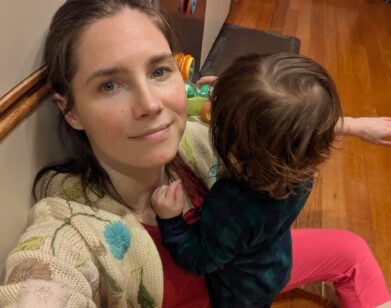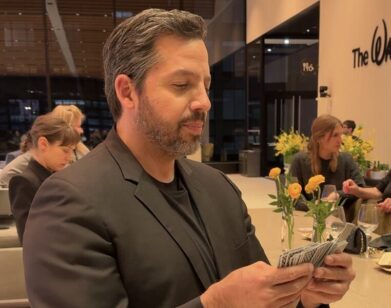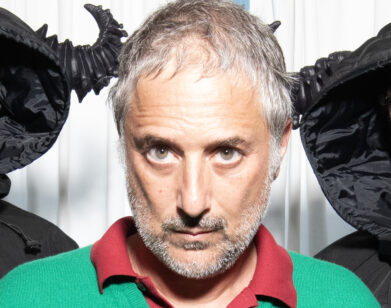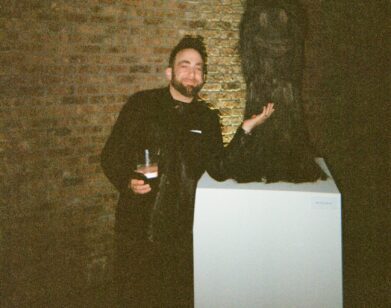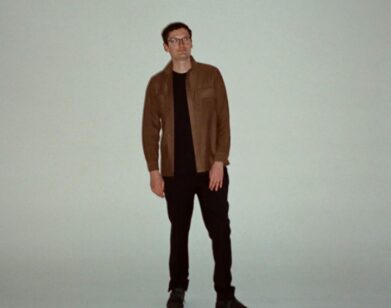Dan Levy’s Family Tree
DAN LEVY IN LOS ANGELES, JANUARY 2016. PHOTOS: CARA ROBBINS. STYLING: LISA MADONNA. GROOMING: ANNA BERNABE/ART DEPARTMENT USING ORIBE HAIR CARE AND LAB SERIES FOR MEN.
Before Pop and CBC picked up Daniel Levy’s debut series as an actor and show runner, Schitt’s Creek, the 32-year-old Toronto native worked as a host for MTV Canada. “It happened as a fluke,” he says. “A friend of mine was working on the launch of the network and had a mandate to bring in a certain number of people to audition.” At the time, Levy was studying film production at Ryerson University. “She called me up one day and I said, ‘Okay. What have I got to lose?’ I’m pretty sure that attitude is what got me the job,” he continues.
Acting, however, had always been in the back of Levy’s mind. “I was too scared to audition for the theater program [at Ryerson]. I didn’t have the confidence to do the monologue and that kind of audition,” he explains. “I always thought, worst come to worst, I could put myself in the films I make. Then I realized that film production was not what I wanted to do and started to get into theater and pursue acting classes.”
Co-created with Levy’s father, actor Eugene Levy, Schitt’s Creek follows the once wealthy Rose family: VHS magnate Johnny (played by the elder Levy), his former soap-star wife Moira (Christopher Guest favorite Catherine O’Hara), and their adult children Alexis (Annie Murphy) and David (Levy Jr.). After a crooked business manager absconds with all their money, the Roses are forced to move from their opulent mansion to a dilapidated hotel in a rural town that Johnny purchased on a whim and promptly forgot about. The town has a particularly unfortunate name—Schitt’s Creek, after the family of the town mayor, Roland Schitt (Chris Elliot)—and an even more unfortunate welcoming sign. Local characters include Stevie (Emily Hampshire), the sarcastic receptionist and manager of the Rose’s motel; Jocelyn Schitt (Jennifer Robertson), Roland’s well-meaning high school teacher wife; Mutt Schitt (Tim Rozon), their handsome, wayward, mountain man son; and Twyla, the sweet space-cadet waitress at the local diner played by Dan’s sister Sarah Levy.
At 25 minutes an episode, Schitt’s Creek is fun, silly, and easy to binge watch. It isn’t pure fluff though; there are real rapports, like the friendship-turned-flirtation between David and Stevie. As longtime friends and collaborators, O’Hara and Levy Sr. have a well-oiled chemistry. “Every time I watch an episode and Catherine’s acting, the dialogue that you’ve written it’s a success,” Levy says. “The character Catherine’s created is so hysterically nuts. Her and my dad play the anchors of the show and we all get to dance around them.”
EMMA BROWN: What was your audition for MTV Canada like?
DANIEL LEVY: They were trying to do a reality show, so there were 10 people when I came in to audition and they had us participate in these challenges. We were given $100 and told to spend it however we wanted and talk about what we bought. Everyone was talking about yoga mats and Jewel CDs. I paid my cable bill with it—I think I also bought some shampoo—and told them, “Thank you for letting me live for the next month.” Somehow they found that charming.
I spent the summer before my last year [at Ryerson] working at ICM just trying to get a grasp on how the behind-the-scenes of the industry worked. I think having spent six months answering phones and playing assistant to some of those agents really brought me out of my shell and prepared me for the audition at MTV, where you had to be talkative and engaged. Previously I was far too insecure and shy to even think of doing that.
BROWN: Your dad has been an actor for a long time. Did you grow up in a film industry household or were you more removed from it because you weren’t in L.A.?
LEVY: My dad made a conscious choice to keep my family in Canada. I think he wanted us to have a pretty normal life and one that wasn’t necessarily affected by the industry or all that comes with growing up in Hollywood. I know how much of a sacrifice that was for him and now that I’m an adult, I look back on that choice with such fondness. I think it’s very rare for someone in entertainment to put their family before work. It was great because you really get to enter that world as an adult.
BROWN: When you told your family you were going to do this job at MTV were they encouraging?
LEVY: They were encouraging with an appropriate amount of reality. My mom’s whole thing was, “This is great. See it as an experience; see it as your first audition. Know that a lot of people have had to audition a lot to get a job.” Then I got a callback and the general consensus was, “Well that’s great. Know that if it doesn’t work out, a lot of people have auditioned and not had it necessarily work out in their favor.” Then I got the job. I think because there is the constant looming threat of nepotism and judgment, I really tried to separate what I was doing at MTV, my auditions, anything I was doing creatively, from my family. It came as a shock to my parents; they had no idea what I was doing in that regard because I made the conscious choice to not ask for help.
After getting the job at MTV, the challenge was, “How do I start my career as a television host without people holding my dad’s career over my head?” It’s a very easy thing for people to look to my dad and say, “Well, he got his job because of this.” I would say that for the first four years of MTV, I never mentioned it. I never invited him to the shows. Once I had the confidence in my own skills and knew I had what it takes to continue on, I started turning to my dad for help and I asked him for his opinions. He did a couple pieces on our show.
BROWN: At what point did you start thinking, “This is great but I really want to try acting rather than just presenting?”
LEVY: I was never fully comfortable as a television host. I hated working red carpets, I hated the whole celebrity interview process. I just realized I’d rather be the person somebody wanted to ask questions to than the person asking the questions. I wanted to contribute; sitting down and asking a series of very generic questions to someone in a press junket was not fulfilling enough. So I left MTV and started to write write television, started to get involved in some improv classes, and then shortly thereafter came up with the idea for Schitt’s Creek. I brought it to my dad as a little seedling of an idea and asked if he wanted to sit down with me and see if there was anything there. I respect his comedic sensibility so much—he has such a unique voice in the comedy world—I thought that idea could benefit from his involvement. The next thing you know we were shooting a presentation pilot and then here we are two seasons in. It’s quite surreal.
BROWN: I read that you heard a story about Kim Basinger trying to buy a town, and that was part of the inspiration for the premise.
LEVY: [laughs] No, we were in the research process of trying to figure out how people lost money—what were some of the things that have happened to people that resulted in bankruptcy? The original premise was “wealthy family loses money and has to figure out what life is like without the band-aid that money can provide.” In the process, we stumbled across this story about Kim Basinger having bought a town in Georgia. We thought, “What if this family had bought a town as a joke because they had that much money, and then when their life bottoms out, the only thing they had left was this town?” That’s when everything started to fall into place.
BROWN: It’s crazy that you can just buy a town.
LEVY: There are a lot of towns for sale in America. There are a lot of towns for sale in Canada. I don’t know why you’d buy one, but the Rose family thought it was a funny birthday present.
BROWN: How did your sister become involved in the show?
LEVY: She’d been acting for a while, long before I got into that world. When we were putting the show together we just kept an eye out for something that would showcase her skills. The character of Twyla seemed like such a good fit. It’s a very lovely gift to be able to come to work every day with your family and see them do good work.
BROWN: Did you get on with your sister when you were younger or did you fight a lot?
LEVY: I’d say it’s a nice half and half. We’re very different people, and I think in high school you do your best to understand your siblings and accept them for who they are. There were some fights. My parents would never let them get bad: “You have to go to bed at peace and in love.”
BROWN: Working with people like your father and Catherine O’Hara, are you good at not breaking when you’re filming a scene?
LEVY: I’m not particularly when I’m with Catherine. Catherine and my dad are very professional; they’ve been doing it a long time. There’s a certain level of freedom that comes with the performances, and I never know what I’m going to get when it comes to working with Catherine.
BROWN: Did you have a sense of the beginning, middle, and end when you started writing the first season?
LEVY: We definitely knew what we wanted from our first season. We knew what we wanted to set up from the beginning, some of the turns we wanted in the middle of the season, and we how we wanted the season to end. Not specifically, just tone and certain emotional beats we wanted to hit. We write our scripts in advance, and once we actually cast the show we went back through our first season scripts and really personalized those characters to the actors we hired. As show runner, I sat down with each of our actors and went through the pilot episode and said, “Is there anything in here that you’re not responding to? Is there anything that feels out of place for your character?” I worked with the actors to make sure our very first episode represented the choices they wanted to make as best as we could. I think you can see that—in our first episode the characters are so clear, and that’s thanks in a large part to a really wonderful cast.
BROWN: Is your character David the easiest character to write for?
LEVY: In terms of fleshing out the stories for David, I have a very intimate understanding of what the character would and wouldn’t do, and what he would and wouldn’t say, but we have a really dynamic writer’s room of all different age groups that cover a lot of the age groups in the show. I love writing for the younger characters in the show; I love creating that strange language that David and Alexis talk to each other in. Then you get to Catherine and that’s the challenge because the standards are so high. All you want to do is impress Catherine O’Hara. I don’t have to worry about that with my dad because he’s my dad and if he doesn’t like it he’ll just tell me.
BROWN: I was watching an interview with your dad and Catherine, and Catherine said she enjoyed watching your dad watch you and your sister act because he would mouth the words alongside you.
LEVY: Oh no! Oh my god that’s so embarrassing. I think for my dad it’s the ultimate dream. He’s giddy about the fact that we all get to work together. He’s had a lovely long career and at this point in his life, getting to go to work every day with his family, he’s on cloud nine clearly. Mouthing dialogue. On the sidelines. Like a parent at soccer practice.
SEASON TWO OF SCHITT’S CREEK BEGINS TOMORROW, MARCH 16, ON POP.

